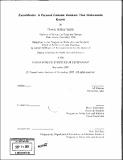EventMinder : a personal calendar assistant that understands events
Author(s)
Smith, Dustin Arthur
DownloadFull printable version (6.221Mb)
Alternative title
Personal calendar assistant that understands events
Other Contributors
Massachusetts Institute of Technology. Dept. of Architecture. Program in Media Arts and Sciences.
Advisor
Henry Lieberman.
Terms of use
Metadata
Show full item recordAbstract
Calendar applications do not understand calendar entries. This limitation prevents them from offering the range of assistance that can be provided by a human personal assistant. Understanding calendar entries is a difficult problem because it involves integrating many types of knowledge: commonsense knowledge, about common events and the particular instances in the world, and user knowledge about the individual's preferences and goals. In this thesis, I present two models of event understanding: RoMULUS and JULIUS. ROMULUS addresses the problem of how missing information in a calendar entry can be filled in by having an event structure, goal knowledge, and past examples. This system is able to learn by observing the user, and constrains its inductive hypothesis by using knowledge about common goals specific to the event. Although this model is capable of representing some tasks, its structural assumptions limit the range of events that it can represent. JULIUS treats event understanding as a plan retrieval problem, and draws from the COMET plan library of 295 everyday plans to interpret the calendar entry. These plans are represented as a set of English activity phrases (i.e., "buy a cup of coffee"), and so the planning problem becomes a natural language understanding problem concerned with comprehending events. I show two techniques for retrieving plans: the first matches plans by their generalized predicate-argument structure, and the second retrieves plans by their goals. Goals are inferred by matching the plans against a database of 662 common goals, by computing the conceptual similarity between the goals and components of the plan. Combining the strengths of ROMULUS and JULIUS, I create a prototype of a personal assistant application, EVENTMINDER, that is able to recognize users' goals in order to propose relevant alternatives and provide useful recommendations.
Description
Thesis (S.M.)--Massachusetts Institute of Technology, School of Architecture and Planning, Program in Media Arts and Sciences, 2007. Includes bibliographical references (p. 81-85).
Date issued
2007Department
Program in Media Arts and Sciences (Massachusetts Institute of Technology)Publisher
Massachusetts Institute of Technology
Keywords
Architecture. Program in Media Arts and Sciences.